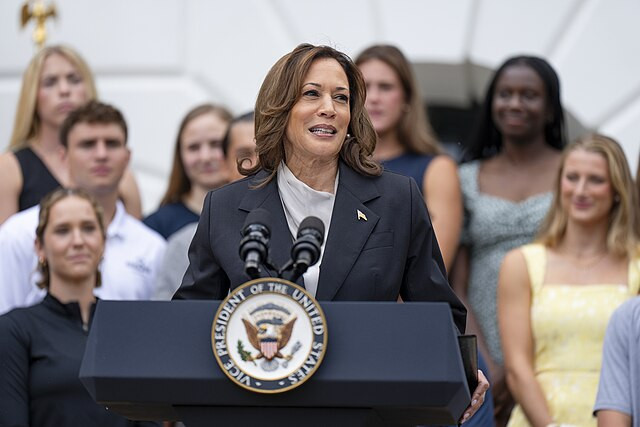Vice President Kamala Harris took to the popular podcast "Call Her Daddy" to criticize Donald Trump's record on abortion and women's rights. The interview, released on Sunday, represented an unusual venue for political discourse, given the podcast's reputation for focusing on sex-positive topics and relationship advice rather than politics.
During the 40-minute conversation, Harris, the Democratic presidential nominee, wasted no time in addressing Trump's influence on abortion laws in the United States, directly attacking his role in shaping the current landscape. "There are now 20 states with Trump abortion bans," Harris said to host Alex Cooper. "This is the same guy that said women should be punished for having abortions."
Harris's remarks referred to Trump's appointment of three conservative justices to the Supreme Court, whose votes were instrumental in overturning Roe v. Wade in 2022. The landmark decision, which had guaranteed federal abortion rights for nearly 50 years, was struck down, allowing individual states to impose their own restrictions on the procedure.
The podcast, which boasts a large and primarily female audience, provided Harris a platform to reach younger voters, a demographic that has shown strong support for her in recent polls. Cooper, who typically steers away from political discussions, acknowledged the unusual direction of the episode. "I am so aware I have a very mixed audience when it comes to politics," Cooper said. "My goal today is not to change your political affiliation."
Harris's appearance on "Call Her Daddy" is part of a broader media blitz designed to dominate the airwaves and shift the narrative away from Trump. In a concerted effort to appeal to a wider audience, the vice president has lined up interviews with CBS's "60 Minutes," "The View," and other high-profile outlets in the coming days. This marks a shift in strategy for Harris, who has previously been criticized for not engaging more frequently with the media.
Meanwhile, former President Trump has maintained his stance that abortion should be a state-level issue, a position he reiterated during a recent rally. Trump has also faced criticism for inconsistent statements regarding women's reproductive rights and his previous remarks suggesting punishment for those seeking abortions.
Harris's critique of Trump on the podcast was pointed and direct. She accused him of spreading misinformation and called his past comments on abortion a mix of lies and manipulations. "This guy is full of lies," she said, echoing her campaign's central theme of questioning Trump's integrity and trustworthiness.
In a related move, Harris's running mate, Minnesota Governor Tim Walz, has also ramped up his media appearances. Walz recently appeared on Fox News and used the opportunity to reiterate his commitment to defending abortion rights and to criticize Trump's mixed messages on the topic. The Democratic ticket is clearly attempting to draw a stark contrast between their support for reproductive rights and the Republicans' restrictive policies.
While on the podcast, Harris also spoke about her own journey as a woman in politics, the resilience she's needed to face criticism, and the importance of reproductive rights in this election cycle. "I don't hear 'no,'" she said, encouraging listeners to maintain their focus and determination. "I urge all the 'Daddy Gang,' don't hear no, just don't hear it."
Trump, who is competing against Harris in the 2024 Presidential election, has continued to emphasize that his policies on abortion reflect the will of the states rather than a federal mandate. However, Harris highlighted the impact of his judicial appointments and the broader implications for women's health and rights in the wake of the Roe v. Wade reversal.
The timing of these media appearances is no accident. With just weeks to go before the election, the Harris-Walz campaign appears to be leveraging every opportunity to sharpen their message and sway undecided voters. They are emphasizing their commitment to women's rights, a strategy they hope will resonate with key voter demographics, including suburban women and younger voters.






